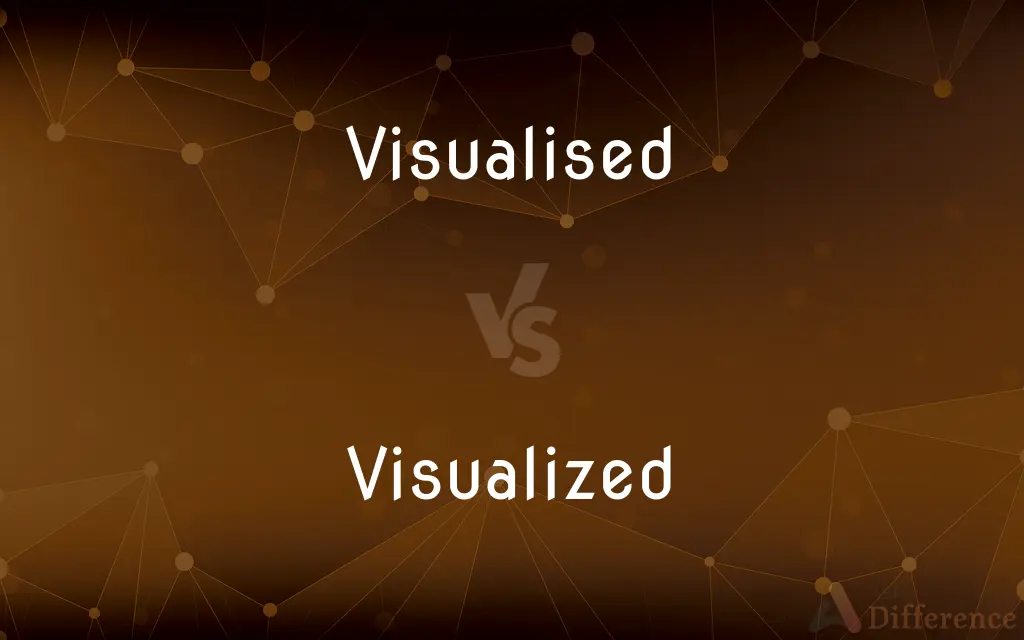Visualised vs. Visualized — What's the Difference?
By Tayyaba Rehman & Maham Liaqat — Updated on March 13, 2024
"Visualised" and "Visualized" represent the same concept of forming a mental image, but they differ primarily in spelling conventions between British and American English.

Difference Between Visualised and Visualized
Table of Contents
ADVERTISEMENT
Key Differences
"Visualised" is the spelling more commonly used in British English. It pertains to the process of forming a mental image of something or imagining how something could appear. This term is used in contexts where there is an emphasis on the power of the mind to conceive images or scenarios that are not physically present. On the other hand, "Visualized" follows the American English spelling convention. It carries the same meaning as "visualised," referring to the act of creating a mental image of something. It is widely used in various fields such as education, psychology, and visualization techniques in personal development and goal setting.
Both terms indicate the cognitive process of envisioning something that isn't visible in the immediate physical surroundings. This can involve imagining complex scenes, visualizing outcomes, or mentally rehearsing actions. The choice between "visualised" and "visualized" largely depends on the writer's or speaker's preference for British or American spelling conventions.
The spelling variation does not imply any difference in the process or effectiveness of visualization as a mental technique. Whether in creative endeavors, strategic planning, or therapeutic settings, the act of visualizing plays a crucial role in bridging the gap between abstract ideas and tangible results.
Regardless of the spelling, visualization is recognized as a powerful tool in enhancing learning, improving performance, and fostering personal growth. It leverages the brain's capacity to simulate experiences, making it a valuable technique in various disciplines and practices.
Comparison Chart
Spelling
-ised ending
-ized ending
ADVERTISEMENT
Usage
Preferred in British English contexts
Preferred in American English contexts
Meaning
Forming a mental image of something
Forming a mental image of something
Application
Creative processes, planning
Education, personal development
Technique
Used in visualization techniques
Used in visualization techniques
Compare with Definitions
Visualised
Involves imagining scenarios or outcomes.
The team visualised their success to boost motivation.
Visualized
Refers to creating a mental image of something.
He visualized the finish line to keep himself focused during the race.
Visualised
Often used in creative and planning processes.
The architect visualised the building's design before drafting the plans.
Visualized
Common in educational and psychological contexts.
The teacher encouraged students to visualize the concepts for better comprehension.
Visualised
The act of forming a mental image of something.
She visualised her dream home in great detail.
Visualized
Enhances focus and intention setting.
In meditation, participants visualized their goals to align their intentions.
Visualised
Can enhance learning and memory.
Students visualised historical events to better understand their context.
Visualized
Used in various personal development practices.
Through visualization, individuals imagined the steps needed to reach their goals.
Visualised
Utilised in therapeutic settings.
Patients visualised peaceful scenes as a relaxation technique.
Visualized
Aids in goal setting and achievement.
Athletes visualized their routines to improve performance.
Visualised
Simple past tense and past participle of visualise
Visualized
To form a mental image of; envisage
Tried to visualize the scene as it was described.
Visualised
Seen in the mind as a mental image;
The glory of his envisioned future
The snow-covered Alps pictured in her imagination
The visualized scene lacked the ugly details of real life
Visualized
To engage in psychological visualization with regard to (pain or a body process, for example).
Visualized
To render visible, as in an image or representation
"Movies have always been keen to visualize the gorier details of ocular trauma" (Dennis Lim).
Visualized
To produce an image or visual representation of (an internal body part or action, for example) by radiological or other technology.
Visualized
To form a mental image.
Visualized
Simple past tense and past participle of visualize
Visualized
Having been the subject of visualization; having had (its) appearance or existence imagined or designed.
Visualized
Seen in the mind as a mental image;
The glory of his envisioned future
The snow-covered Alps pictured in her imagination
The visualized scene lacked the ugly details of real life
Common Curiosities
What does visualized mean?
Visualized refers to the act of creating a mental image of something, typically in American English.
Is there a difference in meaning between visualised and visualized?
No, there is no difference in meaning; the difference lies in the spelling conventions between British and American English.
What does visualised mean?
Visualised means forming a mental image of something, often used in British English.
Can visualisation techniques improve performance?
Yes, visualization techniques can improve performance by mentally rehearsing actions and outcomes.
Does visualising have therapeutic benefits?
Yes, visualising can have therapeutic benefits, such as reducing stress and anxiety by imagining calming and peaceful scenes.
Are there specific fields where visualized is more commonly used?
Visualized is commonly used in fields like education, psychology, and personal development, particularly in American English contexts.
Is visualised used exclusively in British English?
While visualised is preferred in British English, it can be understood and occasionally used in other English-speaking regions.
Is there a preferred spelling in international contexts?
In international contexts, the preferred spelling may depend on the audience's familiarity with British or American English conventions.
How do athletes use visualization?
Athletes use visualization to mentally rehearse their performances, which can help improve actual performance and reduce anxiety.
Can visualizing outcomes influence goal achievement?
Yes, visualizing outcomes can positively influence goal achievement by setting a clear mental target and enhancing motivation.
Are there tools or apps designed to help with visualization?
Yes, there are tools and apps designed to assist with visualization, offering guided imagery, meditation, and goal-setting features.
Are visualised and visualized interchangeable in academic writing?
In academic writing, the choice between visualised and visualized should align with the preferred spelling convention of the publication or institution.
How is visualisation used in creative processes?
In creative processes, visualisation is used to conceive and refine ideas before they are transformed into tangible outputs.
Can everyone visualize things in their mind?
While most people can visualize to some degree, the vividness and clarity of mental images can vary greatly among individuals.
Can visualization techniques aid in learning?
Yes, visualization techniques can aid in learning by enhancing memory and understanding through the mental representation of information.
Share Your Discovery

Previous Comparison
Vomit vs. Yak
Next Comparison
Emit vs. ImmitAuthor Spotlight
Written by
Tayyaba RehmanTayyaba Rehman is a distinguished writer, currently serving as a primary contributor to askdifference.com. As a researcher in semantics and etymology, Tayyaba's passion for the complexity of languages and their distinctions has found a perfect home on the platform. Tayyaba delves into the intricacies of language, distinguishing between commonly confused words and phrases, thereby providing clarity for readers worldwide.
Co-written by
Maham Liaqat














































